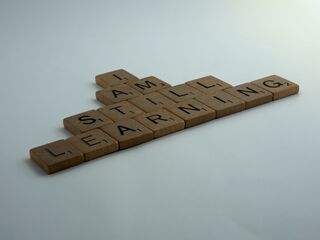Education
Experiential Learning for Grown-Ups
Personal growth doesn’t have to stop at graduation.
Posted November 9, 2022 Reviewed by Vanessa Lancaster
Key points
- Experiential learning is the process of taking active steps toward acquiring skills and knowledge through intentional experiences.
- Before looking for developmental opportunities, assess your skills, knowledge areas, abilities, and gaps. Then, create a plan to fill those gaps.
- Project-based learning, job shadowing, and networking are a few forms of experiential learning for adults.

A young professional shared with me recently what she had lost due to COVID. It was not what you might expect: the lost relationships, health concerns and loss of loved ones, or even the loss of a “real” college experience.
"I lost the ability to try things out,” she said. “I have all these interests – in art, in business, in writing – and I was planning to explore those through summer internships and other experiences to figure out where I was headed. But I didn’t get the chance to do that. How do I do that exploration now that I’m out in the real world and need to pay my rent and move forward with my life and career?
How indeed. We have just started to talk about the very real learning gaps that have developed due to COVID. But what about the experience losses for those who didn’t get to hold internships or part-time jobs, travel with study abroad programs, do research in a lab, or stretch creative muscles through performance?
Not to mention the students who felt added stressors related to managing academics, maintaining scholarships, and trying to find and work part-time jobs due to financial concerns. These losses are significant and are just starting to be realized by both young professionals entering the workplace and their employers who have to manage them.
Our careers are long, and for most, there will be many opportunities to make up for those losses. Even if you aren’t fresh out of college, the process of lifelong learning is both highly individual and increasingly important. One of the marks of a mature, competent professional is the ability and willingness to take ownership of one’s career path, and that includes seeking out those experiences that will help develop skills, knowledge areas, and abilities.
Experiential learning – the process of taking active steps towards acquiring skills and knowledge through intentional experiences – should not end with college graduation. It’s a practice we all can and should carry forward throughout our lives.
From Upskilling to Experiential Learning
Upskilling is an HR process in which organizations focus on continual learning, cross-training, and development of their employees to meet organizational goals. Whether or not one’s organization is providing it, the individual who seeks out experiential learning, and does so strategically, is creating upskilling opportunities for one’s own path.
Experiential learning, as defined by David Kolb, is an iterative process that starts with an experience, which leads to reflection on that experience, resulting in deeper thinking about the meaning of that experience, which leads to action and experimentation to try out that new knowledge (resulting, therefore, in a new experience, and the cycle continues). While experiential learning can be undertaken on one’s own, even deeper knowledge can be gained by engaging a trusted mentor in this process of action, reflection, knowledge acquisition, and application. Mentors can help connect the current experience to future opportunities, provide critical feedback, and encourage future action.
4 Experiential Learning Strategies
What does experiential learning look like outside of school? Start by identifying a potential future role/industry/next step. Next, research the needed skills, knowledge areas, and abilities to achieve that next step. Then, assess your current skills, knowledge areas, abilities, and gaps. And finally, create a plan and take intentional action to fill those gaps.
Here are a few examples that you might try out to build skills, deepen knowledge, and create intentional connections.
-
Project-based learning. Perhaps the easiest way to build your knowledge and experience is to do so as part of your current job. If you find that you lack some quantitative or data skills, seek out a project that will allow you to stretch those muscles. If you have an interest in event management or program planning, ask to take on those roles for an upcoming event. Project-based learning is a great way to acquire skills because it’s finite in length and contributes to the organization’s goals. If you can articulate to your manager how the project also contributes to your own goals and interests, even better.
-
Job shadowing and internships. We often think of job shadowing and internships as experiences limited to college or high school students, but there is nothing that says you can’t create short-term versions as a working professional to learn about a different role or industry. Either within your organization or outside of it, ask someone who holds the position or performs the tasks you are interested in if you can shadow them for a day. Or ask if you can perform a short-term internship for a week or several days.
Most likely, you will need to do this on your own time, which is important to factor in (as is any possible conflict of interest or non-compete issues specific to your role and organization). Before you make the ask, get clear on your goals and what you would like to learn, and be ready to articulate that to the person you are asking to shadow or provide the internship experience.
-
Volunteering. We know that volunteering and service roles are “good things” to do as engaged members of our communities. But these roles also can provide valuable experiences in leadership, project management, volunteer management, event planning, marketing and branding, content development, fundraising, and more. If you’re not getting the training and development you would like through your salaried role, one way to fill that gap is to look for civic, social, or professional organizations to join.
These groups are usually desperate for new volunteers to step up and take on needed roles. Not only are you doing a useful service, but you are also building your network and your resume at the same time.
-
Curiosity conversations. Finally, look for opportunities to continually engage in the process of curiosity conversations or grown-up informational interviews. This is a fantastic way to learn about other roles, industries, and organizations, build your network, and create valuable connections that can pay off in many ways. It may not feel like experiential learning, but part of upskilling is information-gathering: figuring out where your strengths and gaps are and how your skills might align with potential future opportunities.
The great part of doing this work is it’s a simple ask. All you’re asking for are people’s time and their stories. In the process, you are building your network in critical ways that will pay off down the road. Stay curious, be intentional about your gaps and who can help fill them, and ask for those conversations.
Once you have completed the experience, take some time to think about how you will tell the story of what you did and what you learned to a future employer. In doing so, you will deepen your own learning and awareness of your skills and readiness for what's next.




